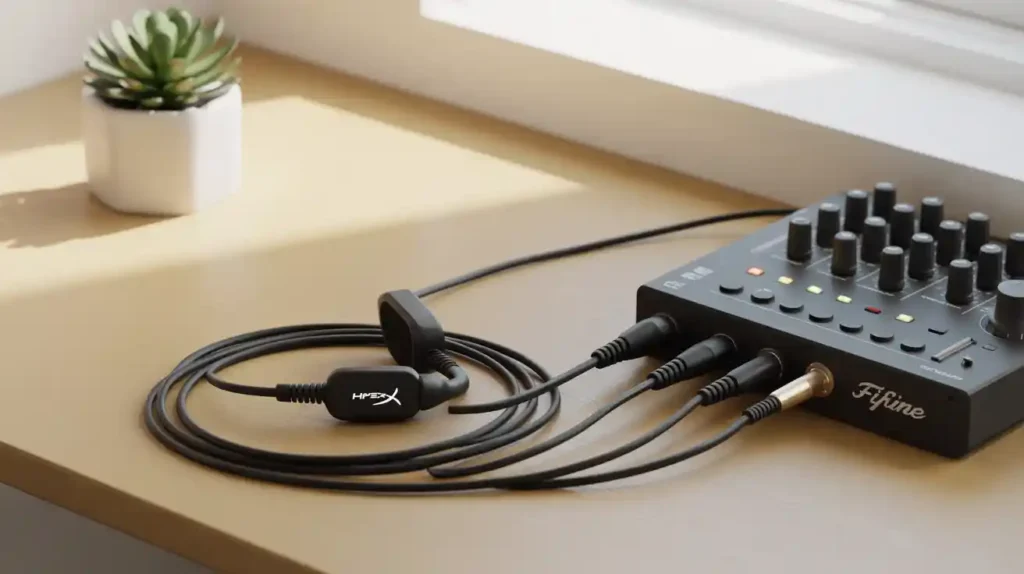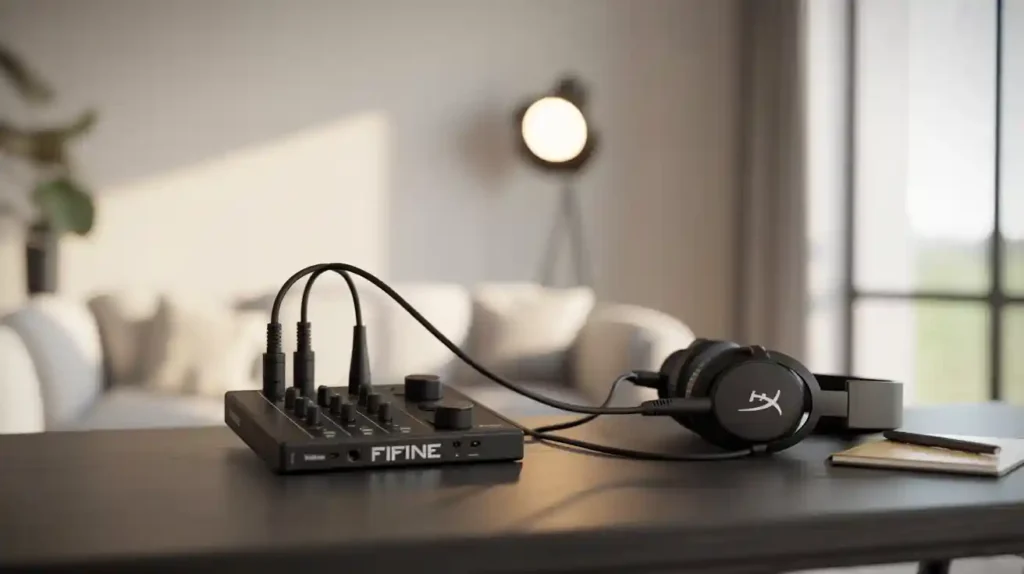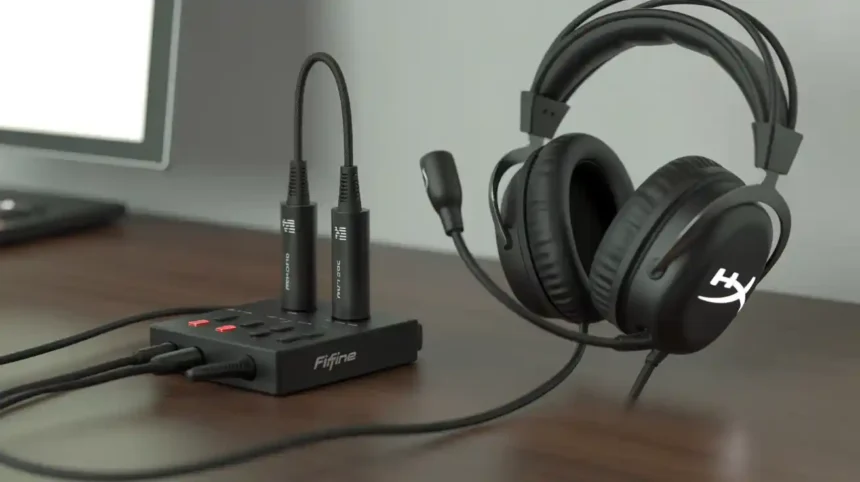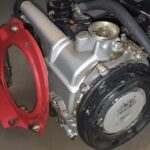Introduction to HyperX Headset Splitter Cable and FIFINE Mixer Integration
Setting up a HyperX headset with a FIFINE mixer can elevate your audio experience. Whether you’re gaming, streaming, or recording, combining these devices ensures high-quality sound and microphone clarity.how to use HyperX headset splitter cable with FIFINE mixer requires careful steps. This guide explains how to achieve a seamless connection effortlessly.
Understanding the HyperX Headset Splitter Cable
The HyperX headset splitter cable is a 3.5mm TRRS-to-dual-TRS adapter. It splits a single 4-pole jack into separate headphone and microphone inputs. Consequently, this allows compatibility with devices requiring distinct audio and mic ports. For instance, it’s ideal for PCs or mixers like the FIFINE SC3, ensuring versatile connectivity.
Overview of the FIFINE Mixer
FIFINE mixers, such as the SC3 or AM8, are compact audio interfaces. They offer XLR and 3.5mm inputs, volume faders, and monitoring features. Additionally, they support 48V phantom power for condenser mics. Therefore, integrating a HyperX headset with a FIFINE mixer enhances control over audio inputs for professional-grade output.

Why Use a HyperX Headset Splitter Cable with a FIFINE Mixer?
Combining a HyperX headset splitter cable with a FIFINE mixer offers flexibility. For example, it allows you to use your headset’s mic and audio separately. Moreover, it enables precise control over input levels. As a result, streamers, gamers, and podcasters achieve better sound quality and customization for their setups.
Prerequisites for Connecting HyperX Headset with FIFINE Mixer
Before starting, gather essential equipment. You’ll need a HyperX headset, a compatible splitter cable, and a FIFINE mixer. Additionally, ensure your mixer has a 3.5mm headset port. Furthermore, check for a TRS-to-TRRS cable if needed. Finally, confirm your device drivers and firmware are updated for optimal performance.
Step-by-Step Guide to Connect HyperX Headset Splitter Cable with FIFINE Mixer
Step 1: Identify Your HyperX Headset’s Connector Type
First, examine your HyperX headset’s connector. Most models, like the Cloud Alpha, use a 4-pole TRRS jack. This combines audio and microphone signals. Therefore, the splitter cable is necessary to separate these signals. Consequently, verify your headset’s jack type to ensure compatibility with the splitter and mixer.
Step 2: Connect the HyperX Headset to the Splitter Cable
Next, plug the headset’s 3.5mm TRRS jack into the splitter’s female port. The splitter typically has two 3.5mm TRS male ends—one for audio, one for mic. As a result, this separates the signals. Ensure a secure connection to avoid audio disruptions during use with the FIFINE mixer.
Step 3: Attach the Splitter Cable to the FIFINE Mixer
Now, locate the FIFINE mixer’s 3.5mm headset port. Plug the splitter’s headphone TRS end into the mixer’s headphone input. Similarly, connect the mic TRS end to the mixer’s microphone input. Consequently, this setup routes audio and mic signals separately, allowing independent control via the mixer’s faders.
Step 4: Configure the FIFINE Mixer Settings
After connecting, adjust the mixer’s settings. For instance, use the volume faders to balance headphone and mic levels. Additionally, enable monitoring to hear real-time audio. If using an XLR mic alongside, adjust the 48V phantom power. Thus, your setup ensures clear audio and mic performance.
Step 5: Test the Audio and Microphone Output
Finally, test the setup. Play audio through the headset and speak into the mic. Check the mixer’s monitoring feature for feedback. Moreover, use software like OBS or Audacity to verify input levels. If issues arise, double-check connections and mixer settings to ensure seamless functionality.

Optimizing Audio Quality with HyperX Headset and FIFINE Mixer
Adjust Volume Faders for Balanced Sound
To optimize audio, fine-tune the FIFINE mixer’s volume faders. For example, increase the headphone fader for clearer audio output. Similarly, adjust the mic fader to avoid distortion. Consequently, this ensures a balanced sound profile, ideal for gaming, streaming, or podcasting with your HyperX headset.
Enable Noise Suppression Features
Many FIFINE mixers offer noise suppression options. Therefore, activate these to reduce background noise. For instance, the SC3 model includes acoustic echo cancellation. As a result, your microphone captures cleaner audio. This is especially useful for streaming or recording in noisy environments with your HyperX headset.
Use Monitoring for Real-Time Feedback
Monitoring is a key feature of FIFINE mixers. Thus, enable it to hear your voice in real time. This helps adjust mic levels instantly. Additionally, it prevents latency issues during live streams. Consequently, your HyperX headset delivers consistent audio quality, enhancing your overall performance.
Troubleshooting Common Issues
No Audio Output from Headset
If no audio plays, check the splitter cable connections. Ensure the headphone TRS is securely plugged into the mixer’s headphone port. Additionally, verify the mixer’s output volume is not muted. Furthermore, confirm your device recognizes the mixer as the audio output source for proper functionality.
Microphone Not Detected
If the mic isn’t working, inspect the splitter’s mic TRS connection. Ensure it’s plugged into the mixer’s mic input. Moreover, check if the mixer’s mic gain is adjusted correctly. If issues persist, test the headset without the splitter to isolate the problem and ensure compatibility.
Static or Buzzing Noise
Static noise often results from loose connections. Therefore, secure all cables tightly. Additionally, avoid using low-quality splitter cables, as they can cause interference. For instance, opt for gold-plated connectors for better conductivity. Consequently, this reduces noise and improves audio clarity with your FIFINE mixer.
Inconsistent Audio Levels
Inconsistent levels may stem from improper mixer settings. Thus, adjust the gain and fader levels carefully. For example, lower the mic gain if distortion occurs. Similarly, increase headphone output if audio is too soft. As a result, you achieve stable audio performance with your HyperX headset.
Advanced Tips for Professional Audio Setup
Combine with an XLR Microphone
For enhanced audio, pair your HyperX headset with an XLR mic via the FIFINE mixer. For instance, the mixer’s XLR input supports high-quality condenser mics. Consequently, you can use the headset for monitoring while recording with a professional mic, ideal for podcasts or streaming.
Use a TRS-to-TRRS Cable for Compatibility
Some FIFINE mixers require a TRS-to-TRRS cable for certain setups. Therefore, if your splitter cable doesn’t work, try a TRS-to-TRRS adapter. This ensures compatibility with devices like the FIFINE SC3. As a result, you avoid connectivity issues and maintain seamless audio performance.
Update Firmware and Drivers
To ensure optimal performance, update your mixer’s firmware and device drivers. For example, HyperX headsets may require firmware updates for compatibility. Similarly, check the FIFINE website for mixer updates. Consequently, this prevents glitches and enhances audio quality during use.
Best Practices for Maintaining Your Setup
Regularly Inspect Cables for Wear
Cables can degrade over time. Therefore, check your HyperX splitter cable for fraying or damage. Similarly, inspect the mixer’s ports for dust or wear. For instance, clean ports with compressed air. As a result, you maintain consistent audio quality and prolong equipment lifespan.
Store Equipment Properly
When not in use, store your HyperX headset and FIFINE mixer safely. For example, use a protective case for the headset. Additionally, keep the mixer in a dust-free environment. Consequently, this prevents damage and ensures long-term reliability for your audio setup.
Test Setup Before Critical Use
Before streaming or recording, test your setup. For instance, run a quick audio check to confirm mic and headphone functionality. Moreover, verify mixer settings are optimized. As a result, you avoid disruptions during live sessions, ensuring professional-grade performance with your HyperX headset.
FAQs About Using HyperX Headset Splitter Cable with FIFINE Mixer
What type of splitter cable works with HyperX headsets?
A 3.5mm TRRS-to-dual-TRS splitter cable is ideal. It splits the 4-pole TRRS jack into separate headphone and mic TRS connectors. Ensure it’s CTIA-compatible for HyperX headsets like Cloud Alpha. Gold-plated connectors improve sound quality and reduce interference.
Can I use a USB HyperX headset with a FIFINE mixer?
USB HyperX headsets bypass the splitter cable, as they don’t use 3.5mm jacks. However, you can connect a 3.5mm HyperX headset to the mixer’s headset port using a splitter cable for separate audio and mic control.
Why is my mic producing static with the splitter cable?
Static may result from loose connections or a low-quality splitter cable. Ensure all plugs are secure. Additionally, use a high-quality, gold-plated splitter to minimize interference. Check the mixer’s gain settings to avoid over-amplification causing noise.
How do I balance audio and mic levels on the FIFINE mixer?
Use the mixer’s volume faders to adjust headphone and mic levels. Start with low gain to avoid distortion. Test with software like OBS to monitor input levels. Adjust faders until audio and mic are clear and balanced.
Can I use the FIFINE mixer with other headsets?
Yes, the FIFINE mixer works with any headset using a 3.5mm TRRS jack and a compatible splitter cable. Ensure the splitter matches the headset’s pin configuration (e.g., CTIA). This ensures seamless audio and mic functionality.
Conclusion: Elevate Your Audio Experience with HyperX and FIFINE
Using a HyperX headset splitter cable with a FIFINE mixer transforms your audio setup. By following this guide, you achieve clear sound and precise mic control. Whether gaming, streaming, or podcasting, this combination delivers professional results. So, connect your devices today, optimize your settings, and elevate your audio experience! Ready to get started? Grab your splitter cable and mixer now!






